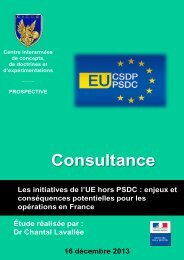Conference
science-research-bulletin-2013-conference
science-research-bulletin-2013-conference
Create successful ePaper yourself
Turn your PDF publications into a flip-book with our unique Google optimized e-Paper software.
EUROPEAN POLICE SCIENCE AND RESEARCH BULLETIN<br />
SPECIAL CONFERENCE EDITION<br />
POLICING ROMA COMMUNITIES IN<br />
SLOVENIA: AN EVALUATION OF THE<br />
COMMUNITY POLICING APPROACH<br />
Branko Lobnikar<br />
Slovenia<br />
Keywords: police, Roma, Slovenia, police training, community policing<br />
Abstract: Policing multicultural communities presents challenges for contemporary policing. Historically<br />
and currently, the interactions between police and multicultural communities are often strained due to<br />
language barriers, cultural misperceptions on both sides, fear of outside authority figures on the part of<br />
marginalised groups etc.<br />
The Roma population, Europe’s largest minority,<br />
is a target of persistent persecution from each and<br />
every power in history and even in the present<br />
times, not only in countries that lack democratic<br />
tradition, but also in countries which consider<br />
themselves cradles of democracy. The first record<br />
of the Roma people in Slovenia goes back to the<br />
14th century. Statistics show that approximately<br />
3 200 Roma people live in Slovenia, but the actual<br />
number varies between 11 000 and 12 000. In<br />
Slovenia, the Roma community is a minority<br />
community recognised by the Constitution as<br />
a special community or minority with particular<br />
ethnic and cultural characteristics (its own<br />
language, culture and history). The constitutional<br />
provision was realised by the adoption of the<br />
Roma Community in the Republic of Slovenia<br />
Act (2007). Slovenia is among those European<br />
countries that include Roma in the management<br />
of public affairs at the local level (as Roma<br />
councillors). The relation between the police<br />
and Roma communities is crucial in many ways.<br />
Roma are often the target of racially motivated<br />
discrimination and violence. Being one of the<br />
most exposed pieces of the state apparatus, the<br />
police are implicated in Roma issue. Locally, they<br />
deal with security issues involving Roma people<br />
being lawbreakers as well as victims on a daily<br />
basis. As in other countries, in Slovenia too, police<br />
have adopted community policing philosophies<br />
and practices. It is important to prepare and train<br />
those public servants who have regular contact<br />
with members of the Roma community. In this<br />
context, training of police officers focuses on<br />
understanding and overcoming discrimination,<br />
prejudice and stereotypes. In 2003 in the Policy<br />
Academy started the project ‘Policing in a multiethnic<br />
community’. The objectives of such<br />
training courses were to make police officers<br />
aware of their own prejudices, to introduce them<br />
Roma culture and traditions, (to understand the<br />
importance of a comprehensive approach, to<br />
evaluate ways of managing security events and<br />
to understand the importance of dialogue. The<br />
aim of the project was also to inform inhabitants<br />
of certain Roma settlements about legislative<br />
provisions concerning typical offences in certain<br />
areas and thus non-criminal incidents, causing<br />
discomfort to the neighbouring population. In<br />
the past years, more than 1950 police officers have<br />
participated in this training. Roma councillors and<br />
other representatives of the Roma population<br />
also participate actively in such training events.<br />
The results are manifold: fewer offences, fewer<br />
occasions when policemen were unable to carry<br />
out relevant procedures, more offences and<br />
crimes reported by Roma themselves, and joint<br />
management (within individual competencies)<br />
of complex security events that might, were they<br />
not resolved in a timely manner, become serious<br />
crimes.<br />
63





